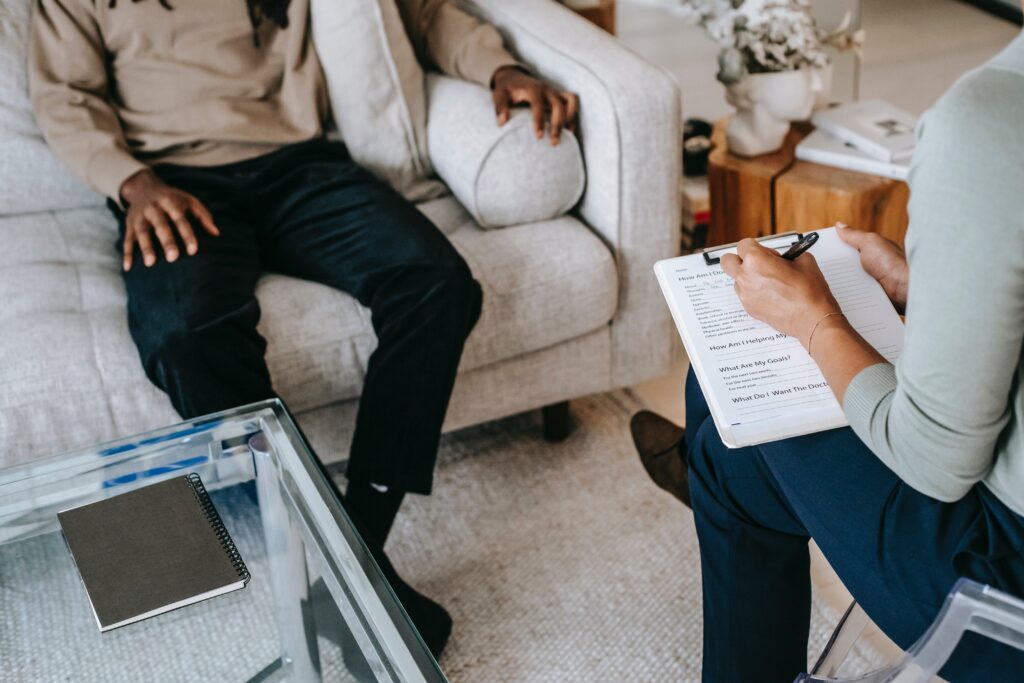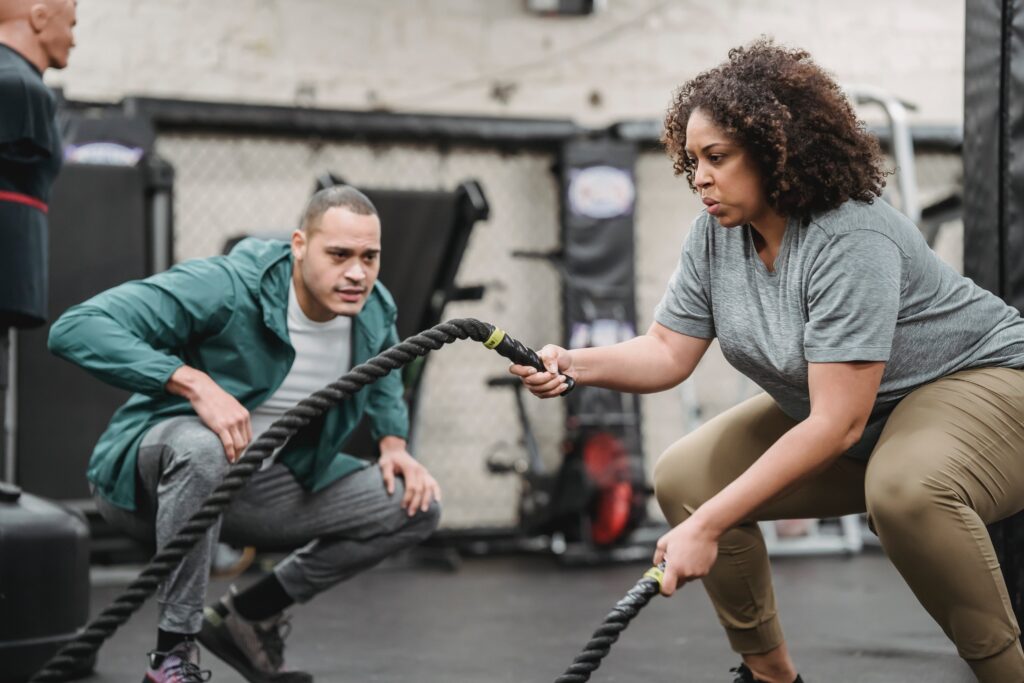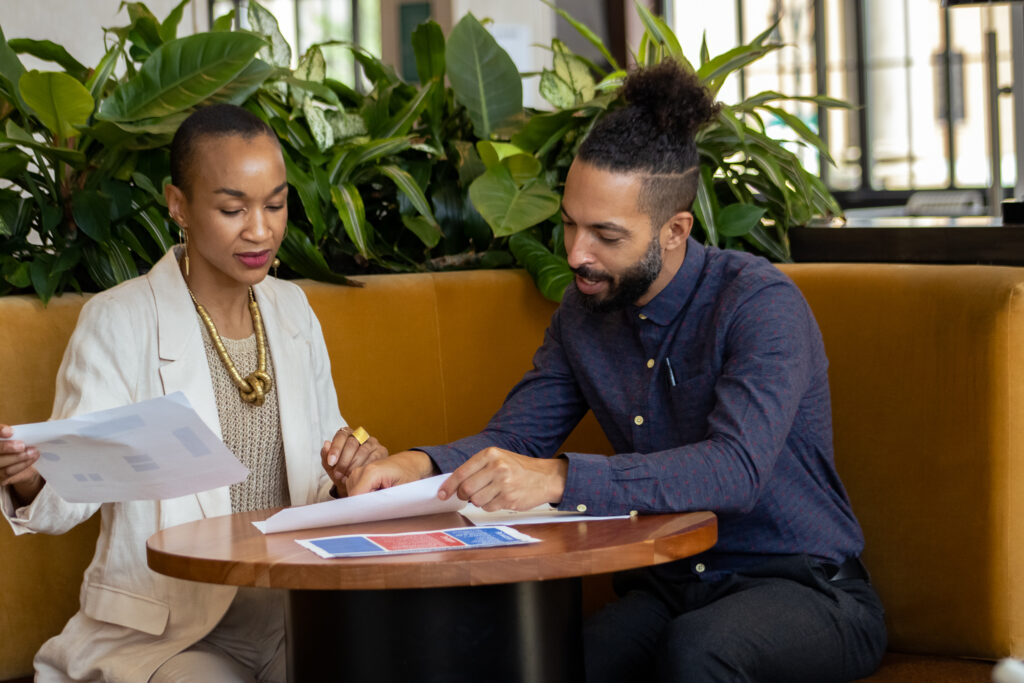
Image of a person seated on a couch being asked intake questions. Photo by Alex Green from Pexels
- The DEI industry is sick and a few under-resourced quarters away from a terminal diagnosis. The dis-ease is festering. Despite its good intentions, unconscious bias training, and repeated trips to the DEI practitioner’s office, the industry has reached market saturation without producing the crops of long-term cultural change that 2020 demanded of us. In the wake of the recent Supreme Court ruling on affirmative action and the series of slashes in civil rights for the LGBTQIA+ community, the industry must adapt.
- What is dying, what is attempting to be reborn, and what can we do?
As a facilitator whose personal and professional labor aligns with the values of diversity, equity, inclusion, and anti-racism, this is what I see:
Many DEI consumers are operating in a low-maturity model.
- Responsible culture leaders are aching for DEI solutions that make the social pain of exclusion and discrimination go away. Often in response to external forces, this style of behavior can be impulsive and reactive at times, as the global unrest of 2020 revealed. The market had to respond to the blunt-force trauma immediately.
- Three years later, many decision-makers still operate out of this urgency and engage in DEI solutions in a consumptive way; repeatedly applying one-off training or DEI programs like bandaids on a deep wound. But the malignancy that we are attempting to heal is centuries old and much further down.
- To heal is to transform, to alchemize. Within the frame of an individual, it is a commitment to the uncomfortability of not knowing, learning, trying, dusting ourselves off, and trying again. In the context of an organization that is pinned to the ground of an unjust society, it is to engage in continual process improvements, behavioral accountability that is modeled from the top down, and community-centered shifts in power. To truly recover, one cannot exist without the other.
- In my opinion, it is an unrealistic and perhaps immature view to say that after 3-5 years of attempting to dissolve solidified systems of oppression that DEI doesn’t “work.” Cultural change is not microwavable. Instead of applying the same strategies over and over, it is time to blow up the game.
Industry-agnostic DEI Generalists
- The DEI industry was birthed out of the Civil Rights movement of the 1960s and is still coming of age. The people who occupy titles like Chief Diversity Officer, DEI program manager, consultant, and facilitator come from a range of professional backgrounds and are often industry-agnostic. This wide-net approach offers adaptability, but serving a broad client base has its downsides. By trying to help everyone, you end up helping no one, Keita Williams once told me.
- When the market is full of generalists, there can be very little innovation. The DEI needs of a manufacturing company are very different from a multi-national design organization or an arts-based non-profit. Surface-level strategies often stop at awareness and don’t address the deep tissue issues. When your foot is broken, you don’t go to a general practitioner. You see a podiatrist. Instead of a one-size-fits-most approach, DEI professionals should consider becoming specialists with areas of expertise. Folks willing to put their stake in the ground and dig deep into a specific industry, audience, or practice.
The delusion of DEI saviorism
- We expect a lot from DEI professionals. They hold the keys to our transformation, free us from our biases, improve hiring processes, hold leaders accountable, and help us make gains toward a more inclusive workplace. All of this while balancing power dynamics, budgetary constraints, and being imperfect humans. The idea that one individual/group alone can lead us to an equitable promised land is rooted in the mythologies of saviorism and individualism. It is the cultural equivalent of expecting a chiropractor to cure all of your ailments.
- When we make DEI professionals our organizational saviors who judge what is morally right, wrong, just, and fair, we strip the individuals of their ability to think critically about how they can make positive change happen in their sphere of influence. At this stage in our collective awareness, we must recognize that DEI is a worldview, a lifelong journey, and a series of repeated actions. Not everyone is willing to subscribe. When DEI is treated like someone else’s job, it absolves accountability. When it isn’t bound to individual and organizational goals, it gets labeled a distraction.
- How many of us can we say that we’ve fully allowed the DEI transformation to take root in our personal and professional lives? Have we put the proper guard rails in place to actualize accountability? How you do some things, is how you do most things. So if you’re ready to give up on DEI efforts, what else have you given up on?

Image of a person working out with a trainer. Photo by Julia Larson from Pexels
Now, I’ll be the first to admit that I have participated in each of these scenarios throughout my DEI career. Like many others, I entered the market as a generalist and attempted to save everyone from the cultural poison of anti-black racism. I took on projects that fell outside of my expertise to be seen as a valuable expert. As a Black woman, I balanced the often difficult energetic exchange of educating predominantly white audiences about the harm that my community has experienced. Once seen as savoirs, the tides for Black women in the DEI space are turning.
After two years of conscious reflection on how I show up in the DEI world, I can say with full confidence that this aspect of my professional persona has died. I am no longer willing to do it all or do it alone. I am willing to swim against the current, take it slow, and carve out my areas of expertise. After taking a long look in the mirror I asked myself, what are my unique gifts? How can I do DEI work in a human-centered way that feeds me joy while helping others?
I am a seeker and disruptor in the DEI industry. This is what I see on the horizon and what you can expect from me:

Image of Michaela Ayers supporting a people manager. Photo by Fako Media.
What is on the horizon
- Getting specific: A focus on creatives/design
- Creativity is the natural order of life. As a multi-disciplinary artist, I see how the practice of design shapes our world and ignites my deepest passions. That is why I am making the conscious choice to shift from functioning as an agnostic generalist to a DEI specialist with a focus on creative design industries. This is my stake in the ground, this is where I believe I can make the most artful impact while joyfully channeling my unique gifts.
-
- Through the mediums of collage, storytelling, and placemaking, I explore the concepts of diversity, equity, anti-racism, and inclusion. As an Art Historian, I am eager to tap into the power of colors, shapes, symbols, stories and textures to cultivate the kind of deep knowing that we don’t always have language for. I am ready to support leaders and creative thinkers who are hungry for the non-traditional, interactive, and imaginative. Let’s play!
- Skill-based training: A focus on communication, collaboration, and creativity
- Over the years, I have facilitated my fair share of DEI focus groups with early to mid-career professionals. As an infinitely curious person, I have a burning desire to understand what repeated behaviors build DEI muscle and stamina. When I asked adult learners what skills they associate with DEI, the responses were primarily rooted in expressions of soft power – the ability to influence the preferences of others through communication and collaboration. Cooperation over coercion.
-
- On a skill level, that looks like a focus on verbal and nonverbal communication, the ability to resolve conflict, work as a team, cultivate empathy, actively listen without judgment, and be open-minded. While it might be tempting to devalue the importance of these relational competencies, the fact is most people have limited interpersonal communication skills and those abilities evaporate when a little conflict and difference of identity exists in the dynamic. When in your professional career have you been taught how to disrespectfully disagree across a spectrum of identities or levels of leadership? The answer might be never.
That is why I am shifting my core offerings to focus on communication, collaboration, and creativity. I am interested in designing experiences that ease the social pain of miscommunicating across differences by leveraging the power of creative play. Play, a form of practice, allows learners to exercise their communication skills in groups where people feel safe to frolic, learn, take and risks. By designing playful experiences, we help adult learners cope with stress, increase creative confidence, and imagine new possibilities. By inviting people to create tangible objects that support them in talking about what can feel like untouchable topics, we open the door to the kind of shared vulnerability that shifts perspectives.
- Experiential learning + DEI Edutainment
- After years of learning online and alone, people are hungry for human connection and conversation. No more lecture-style workshops or boring click-through training, adult learners are looking for something that will make them feel fully alive.
-
- Since the beginning of Nourish, I’ve been interested in more interactive, immersive learning experiences. With memories of sitting around the table at my grandparent’s house, passing plates, and digesting the day’s stories, I got my start facilitating DEI dinner parties. A student of Priya Parker’s The Art of Gathering, this social art practice quickly evolved into a series of DEI community events because I recognized a need for active learning spaces where people could engage with compelling content and folks from different backgrounds.
-
-
- What kind of activations would turn this event into a memory the audience will never forget?
- What kind of meaningful conversations unlock moments of insight?
- How can I tap into a person’s inner wisdom?
-
These are the questions that drive my work. In the year ahead, I’m doubling down on DEI experiences; throwing dinner parties, hosting retreats, and facilitating creative workshops. I am interested in getting people out of their heads and into their bodies to have real conversations with their peers. DEI edutainment spaces where laughter, messiness, moral courage, and mutual understanding can all emerge. In this way of being, DEI engagements can be used as a powerful tool that transforms dull training into a truly nourishing experience.
So what can you expect from me in 2023?
With the previous iterations of DEI identity behind me, I am excited to blaze my own trail as a creative with a hunger to serve other creatives. After years of casting a wide net, I am eager to deepen my expertise in the artful arena of educational DEI events. Because DEI work doesn’t just have to be uncomfortable and hard, it can also be joyful.
My intention for this article is to start a conversation across the DEI industry. If the insights offered here struck a cord, please reach out. These thoughts have been living in my head for a long time and I’m sure I’m not the only one who is eager to evolve.
Thank you for witnessing my transformation and being along for the ride.
Warmly,
Principal and Founder at Nourish
